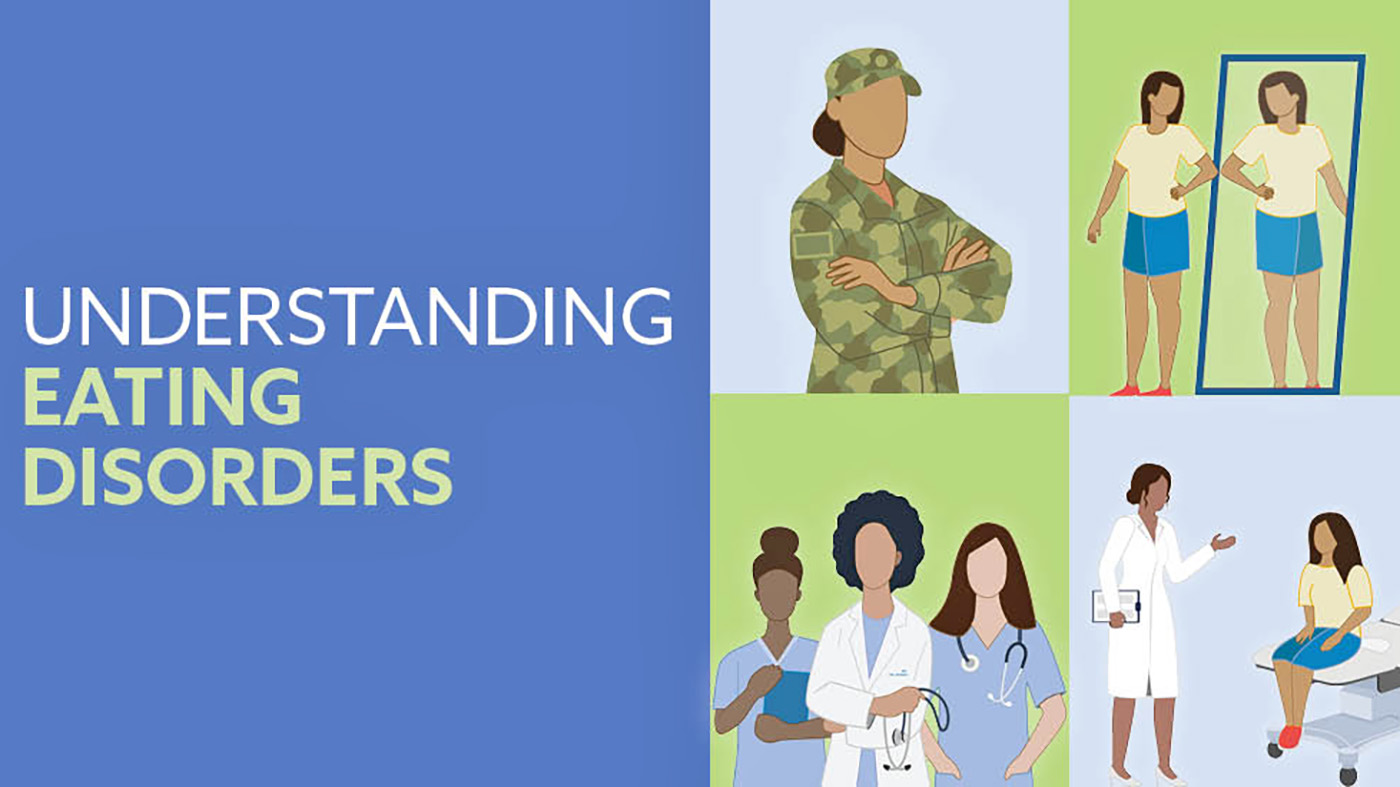Eating disorders affect many Veterans, but as a woman Veteran you may be at an increased risk. From unpredictable eating schedules and meals eaten quickly to trauma and the pressure to “make weight,” your previous military experience might affect your relationship with food today.
What is an eating disorder?
An eating disorder is a serious mental health condition where unhealthy eating patterns can increase your risk for health problems including life-threatening issues. You cannot tell if someone has an eating disorder just by the way they look. Eating disorders can affect people of any age, shape, size, race, ethnicity or gender.
Eating disorder symptoms look different for everyone and may include:
- Restricting: Severely limiting food to the point of being undernourished (anorexia). This can include not eating enough, limiting certain types of food and following strict eating rules.
- Binging: Eating a large amount of food in a short time (such as two hours). You may feel like you can’t stop yourself from eating. You may try to hide how much you eat, and you may feel shame or regret later.
- Compensating: Getting rid of calories or “undoing” a binge. This may include forcing yourself to vomit (bulimia), exercising excessively (and exercising while sick or injured) and misusing laxatives, diuretics, insulin or thyroid medications.
Detecting an eating disorder as soon as possible is key to avoiding long-term health problems, including fertility issues, thinning bones, wasting muscle, heart damage and more. You may also notice visible changes like brittle hair and nails, yellowing skin or decaying teeth.
Am I at risk?
Women are more likely than men to experience eating disorders, but Veterans overall are at an increased risk. This may be due to some unique aspects of your military service, including:
- Being exposed to trauma, such as military sexual trauma (MST) or having posttraumatic stress disorder (PTSD)
- Unpredictable eating schedules and meals, such as going long periods without eating, eating too quickly and having less variety of food available
- Pressure to “make weight” during service and emphasis on measurement and weight standards
Other factors may increase your risk outside your military service, including family medical history, other mental health issues, chronic or “yo-yo” dieting, a history of being bullied due to weight and more.
What can VA do for me?
If you’re concerned about unhealthy eating patterns, the first step is to contact your VA primary care or mental health clinician. They can help you identify whether your eating is problematic and guide you to the best resources for you, including possible VA outpatient treatment as well as higher levels of care, if needed.
VA also offers mental health services, including therapy, medications and treatment for conditions or experiences associated with eating disorders, such as PTSD, MST or depression. Learning how to manage stress or building a healthier lifestyle can also help with eating disorders.
Check out VA’s Whole Health resources to help you develop a plan based on your needs, including overall wellness and lifestyle, or visit VA’s Nutrition and Food Services to connect to dietitians.
If you don’t currently have a primary care provider, contact the Women Veterans Program Manager at your local VA or call/text the Women Veterans Call Center at 1-855-VA-WOMEN to connect to care.
For more information, visit our VA Women’s Health Disordered Eating page and listen to this She Wears the Boots podcast episode.
Topics in this story
Link Disclaimer
This page includes links to other websites outside our control and jurisdiction. VA is not responsible for the privacy practices or the content of non-VA Web sites. We encourage you to review the privacy policy or terms and conditions of those sites to fully understand what information is collected and how it is used.
More Stories
Dorothy “Pat” Rudd, 103, World War II Navy Veteran, has lived a life of service, pioneering the way for women in the military.
VA employees help return WWII items to two brothers’ families. Both brothers were WWII Veterans.
The Veterans self-check assessment takes about 10 minutes to complete and has resources that can help if stress and depression are affecting you.






I have a lack of self asteem for lack of ability because of military injuries it affects my social disorder cause im getting fat from cheap food and inability to excercise and that causes self asteem issues to find a female partner for sexual intercourse unless i want a fat hog girlfriend
My injuries prevent me from certain exercise’s now ive been waiting since may 2023 to get seen and treated for a old injury with no reprieve got seen but cboc for outsource medical help sucks around here
Why do we not have a program with helping veterans get social security
Cant hardly afford groceries cant afford bills because va wont protect veterans with disabilities in support matters and those people keep taking half or more of our benefits check so the injured vet is left to starve and stink and have no electric
Please call me or email me so I can better understand
This is the first time I’ve addressed this. I’m 78 and required to wear a catheter for the rest of my life. I used to run 5 and 10Ks and swim laps equaling half and full miles. Now, I’m unable to do any of that. I need a walker for trips outside.